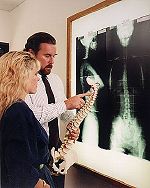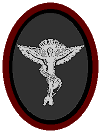| |
|
A. Stress
is something that we've all heard a lot more about in the last few years.
Stress comes in many forms, both mental and physical. Some of the worst
mental stressors can be a death in the family, divorce, loss of a business,
or a notice of an audit from our friends at the IRS. Physical stress
may result from a car accident or other trauma. It may be from an illness
or surgery. It could be from long hours at the office or even from a
long trip.
Whether
the stress is mental or physical, most of us experience it in one form
or another. When the stress is long-term or chronic, or when we experience
a combination of mental and physical stress, the effect on the body
will be more severe.
Bernie
Siegel, M.D., stated: "It's often said that stress is one of the
most destructive elements in people's daily lives, but that's only half
true. The way we react to stress appears to be more important than the
stress itself."
Stress
has a number of effects on the body. It has been shown to weaken the
immune system, making us more susceptible to disease. It depletes our
bodies of vitamins and minerals. It tenses our muscles, which results
in muscle spasms and tension headaches. Energy is drained; blood pressure
goes up.
So
what can we do to combat all this stress? The medical approach has been
the use and abuse of tranquilizers and sedatives, Valium being one of
the favorites. Non-prescription or illegal drugs including alcohol,
marijuana, or others might be used. These actually add to the stress,
especially when they become a habit.
There
is a better way, but it takes some work and it may not be easy. First
of all, it is important that any of the signs of stress be checked out
by your chiropractor or a family physician to be sure that it is just
stress. Then it is a matter of looking at the five phases of health
to see which ones need the most attention. Those five phases are nervous
system functions, exercise, nutrition, rest, and mental attitude. To
go into detail about all five could fill a book.
As
a chiropractor, my first concern is to see that your nervous system
works at its optimum. Since the nervous system controls the rest of
the body, it is a crucial first step toward fighting the effects of
stress. Next, it is equally important to see where you need help in
the other four areas. Increasing your exercise level and improving your
nutrition, especially with certain vitamins is very effective. Rest
and relaxation techniques are also necessary. Massage has also been
shown to be helpful, which is one of the reasons I have massage therapists
in our clinic. Psychologically, massage relieves fatigue, reduces tension,
calms the nervous system, and promotes a sense of relaxation and renewed
energy.
In
conclusion, nobody is completely immune to stress. However, there are
a number of things that you can do to combat it effects. A saying I
use is, "If you want to drive a Ferrari, you've got to keep it
tuned up." In other words, if you demand a lot from your body and
are subject to high stress, you must put time into keeping your body
tuned up or it will break down. Chiropractic and massage are proven
ways to keep you "tuned up."
  
  

|


